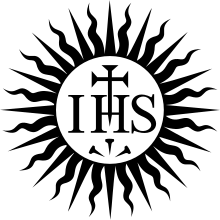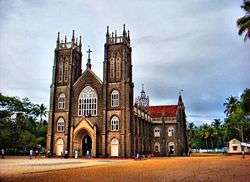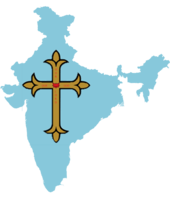Giacomo Fenicio
Rev. Fr. Giacomo Fenicio (1558 - 1632), also known as Arthunkal Veluthachan (Malayalam: അർത്തുങ്കൽ വെളുത്തച്ചൻ), Jacomo Fenicio or Jacob Fenicio was an Italian Jesuit priest, scholar, theologian, and missionary in India.
| Part of a series on the |
| Society of Jesus |
|---|
 Christogram of the Jesuits |
| History |
| Hierarchy |
| Spirituality |
| Works |
| Notable Jesuits |
|
|
He served in South India as a priest and missionary from 1584 to 1632.[1] He was a was one of the first Europeans who researched and authored scholastic literature about Hinduism.[2] He was popular known among Christians of Kerala and known as Arthunkal Veluthachan or fair skinned father of Arthunkal.[3][4]
Personal life

Fenicio was born in Capua, Italy in 1558. He arrived in India in 1582 and spent the next 48 years in South India.[5] He became the second vicar of St. Andrew's Basilica, Arthunkal in Kerala after the death of the first vicar, Fr Gasper Pius, who built the church. Fenicio was well known for his tolerance towards other religions. He was popular among the local people and was affectionately called Arthunkal Veluthachan.[4] Fenicio died in Cochin in 1632.[6]
See also
References
- Pariyaram Mathew Chacko (17 February 2005). Tribal Communities and Social Change. SAGE Publications. p. 164. ISBN 978-0-7619-3330-4.
- Journal of the Oriental Institute. 52. Vadodara, India: Oriental Institute. 2002. p. 56.
- "Forgotten tale of religious harmony". Deccan Chronicle. December 6, 2013. Retrieved December 23, 2018.
- "Church Portals Open for Ayyappa Devotees". Outlook. January 13, 2010. Retrieved December 23, 2018.
- Stephen Neill (29 January 2004). A History of Christianity in India: The Beginnings to AD 1707. Cambridge University Press. pp. 247–. ISBN 978-0-521-54885-4.
- Bhandarkar Oriental Research Institute (1978). Annals of the Bhandarkar Oriental Research Institute. p. 526.
